Key takeaways:
- Communication frameworks enhance clarity and connection in interactions, guiding effective dialogue.
- Theory refinement is crucial as it allows communication strategies to evolve and adapt to contemporary dynamics and diverse perspectives.
- Gathering feedback, testing ideas in real-world contexts, and reflecting on experiences are essential steps in the theory refinement process.
- Listening, patience, and self-reflection significantly contribute to effective theory evolution and deeper connections.
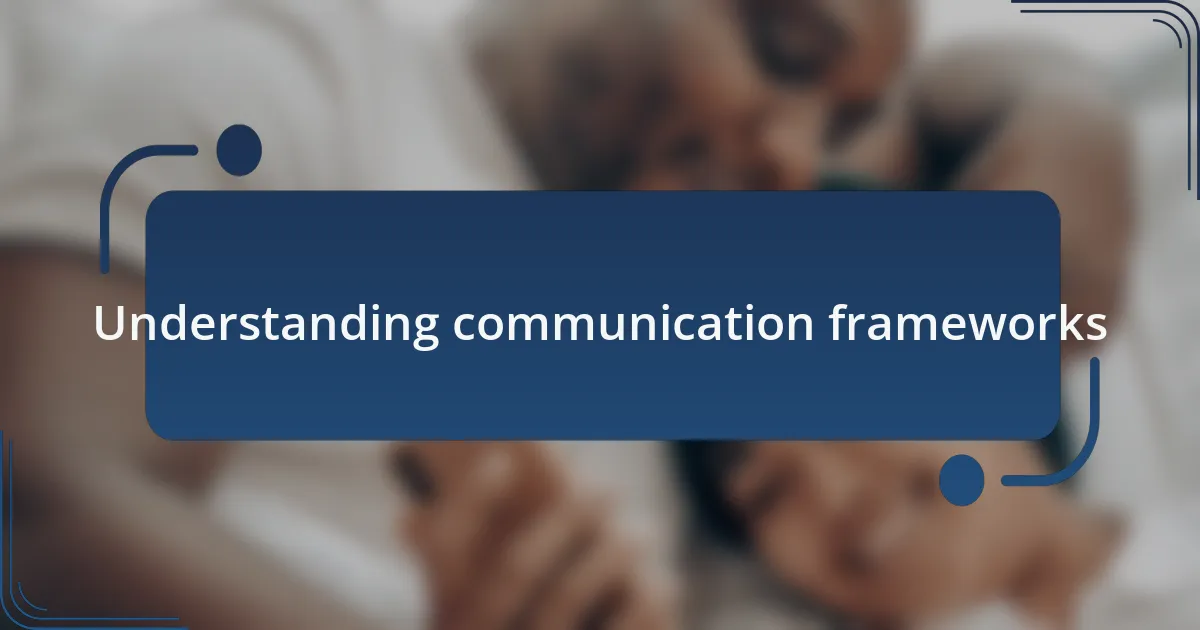
Understanding communication frameworks
Understanding communication frameworks involves recognizing the structures that facilitate effective interactions. I remember my first experience diving into these frameworks; it was like uncovering a hidden map that guided conversations. Have you ever felt lost in a discussion? Knowing how communication frameworks operate can illuminate the path to clearer understanding and connection.
At their core, communication frameworks provide a lens through which we can examine the dynamics of sharing ideas and emotions. I once struggled with conveying a complex idea to a colleague, and it was only when I reflected on the framework we were operating within that I realized how clarity and context could enhance our dialogue. Isn’t it fascinating how the right framework can transform confusion into collaboration?
Moreover, these frameworks aren’t just theoretical; they are so deeply intertwined with our daily interactions that we often don’t even realize their presence. I often catch myself assessing my conversations unconsciously through these lenses, shaping how I relate to others. Do you find yourself doing the same? Understanding these structures can indeed empower us, allowing us to communicate not just effectively, but authentically.
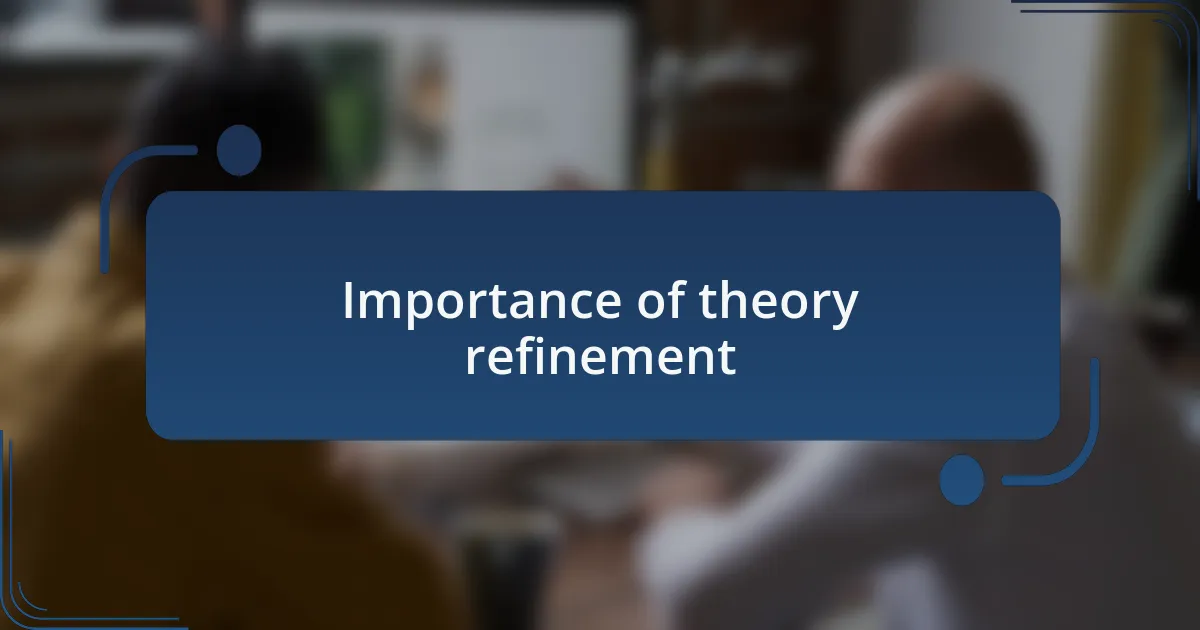
Importance of theory refinement
When I think about the importance of theory refinement, I’m reminded of how essential it is to ensure that our communication strategies evolve alongside our understanding of human interaction. Early on in my career, I encountered situations where outdated theories led to misunderstandings among team members. It was like trying to navigate a ship with an old map; the waters had changed, but we were still relying on guidance that no longer applied. Have you ever felt out of sync because the old ways just didn’t resonate anymore?
Refining theories allows us to adapt our methods and align them with contemporary dynamics. I recall a particular workshop I facilitated, where the discussions around refining our communication approaches revealed a wealth of insights. Participants felt liberated to explore new ideas, which ultimately led to more effective team collaboration. Isn’t it empowering when we can tweak our frameworks based on real experiences instead of clinging to rigid models?
Moreover, theory refinement enhances our ability to address the nuances of different contexts and cultures. I once attended a conference where scholars shared their revised theories, emphasizing the need for flexibility in communication styles across various demographics. It struck me how vital it was to remain open to change, considering each conversation is uniquely influenced by its participants. Through this process, we create a richer tapestry of understanding, don’t we?
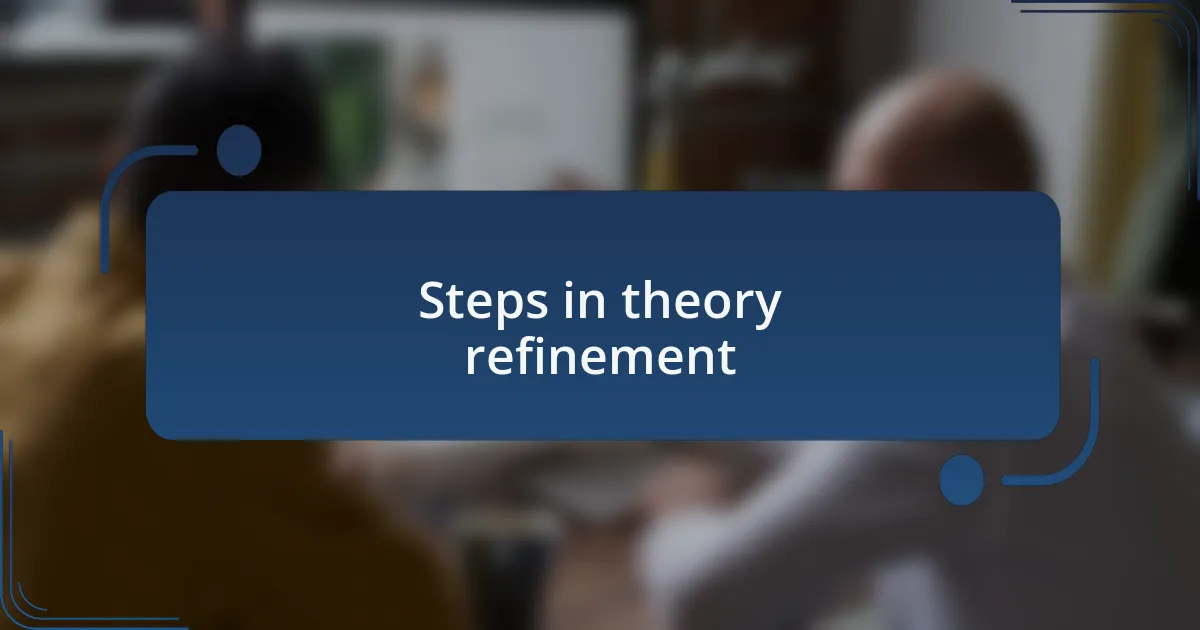
Steps in theory refinement
When it comes to refining theories, the first step I often take is gathering new data. For me, this involves seeking feedback from peers and analyzing recent research. I remember sitting down with a colleague after a team project and discussing what went well and what could improve. That conversation illuminated gaps in our existing theoretical framework that needed to be addressed. Have you ever noticed how fresh perspectives can spark critical reflections?
Next, I find it essential to test these updated ideas in a real-world context. Implementing small changes while observing the results offers invaluable insights. For example, during a recent communication training, I adjusted our approach based on the feedback we collected earlier. The immediate improvement in participant engagement showed me that even minor tweaks could yield significant results. Have you ever adjusted your plans based on real-time feedback and seen a shift in outcomes?
Lastly, reflecting on what I’ve learned from these experiences allows me to solidify my theories. Crafting a narrative around my findings helps clarify the evolution of my thought process. After a successful series of workshops, I took the time to write down the shifts in my approach, which ultimately helped me communicate these new theories effectively to others. This continuous cycle of reflection and adaptation feels crucial—don’t you agree that growth comes from understanding our journey?
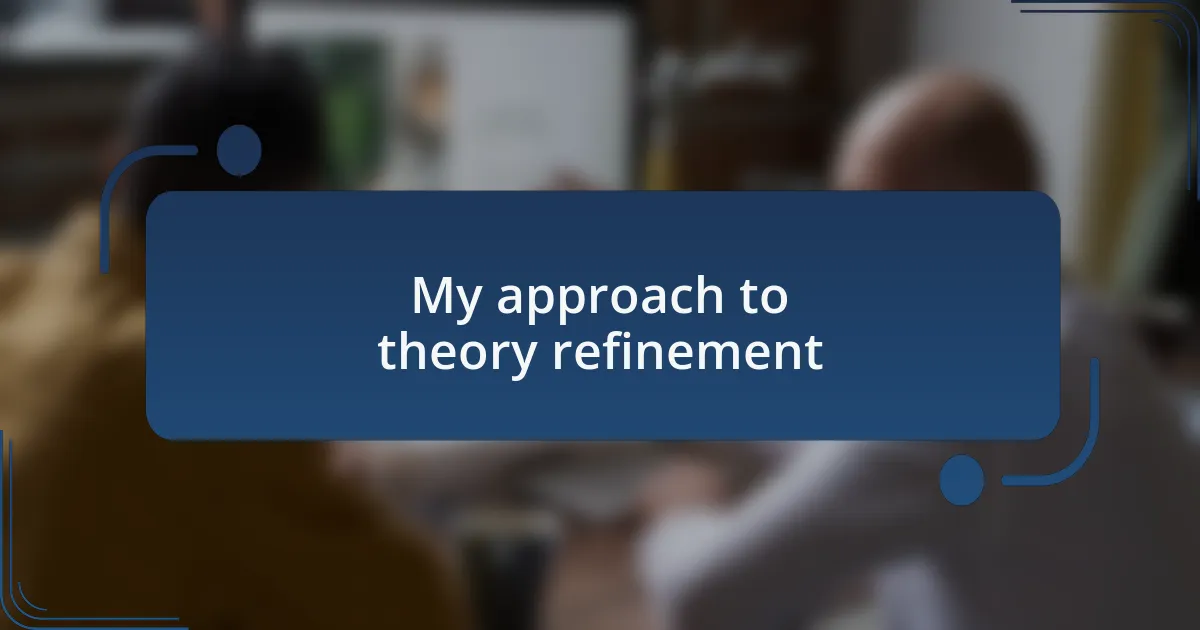
My approach to theory refinement
As I dive into my approach to theory refinement, I often start with a deep personal reflection on what I’ve observed. I recall a scenario where I facilitated a small group discussion on effective communication. Listening to participants share their thoughts made me realize how their experiences challenged my initial assumptions. Have you ever had a moment where your perspective shifted just by hearing someone else’s story?
Once I gather insights from discussions, I’m eager to put new concepts into practice. I distinctly remember trying out a revised communication strategy during a project kick-off meeting. It was nerve-wracking to step out of my comfort zone, but as I engaged with the team, I noticed increased collaboration. This taught me the power of vulnerability—how stepping away from rigid theories can foster a more dynamic, relatable approach. Haven’t you felt the energy change in a room when ideas flow more freely?
Finally, I embrace a habit of journaling my theory evolution throughout this process. Writing down my thoughts and reflections helps solidify my learning and reveals patterns I might have otherwise missed. I once penned a summary after a particularly enlightening conference, and it crystallized my evolving approach to communication frameworks. Don’t you find that capturing insights can illuminate the path forward in unexpected ways?
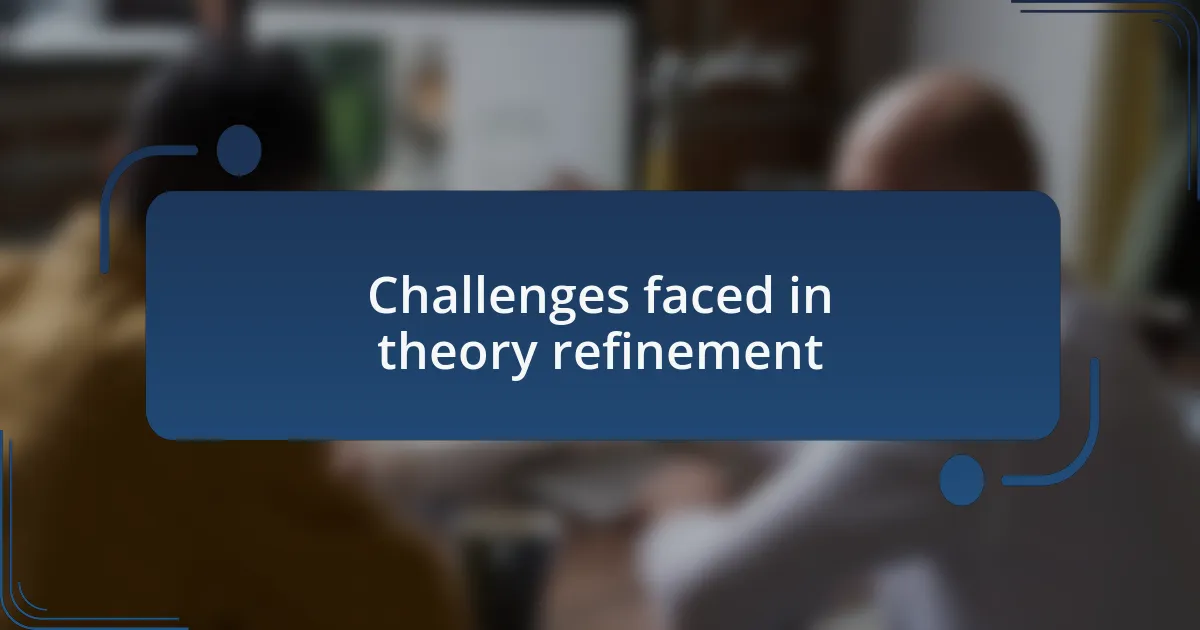
Challenges faced in theory refinement
As I navigated through the theory refinement process, I faced the challenge of addressing deeply ingrained beliefs. There was a moment during a critical feedback session when a colleague pointed out inconsistencies in my communication model. It stung, but it forced me to confront the biases that had shaped my views. Have you ever been challenged in a way that left you feeling exposed yet motivated to improve?
Another hurdle involved integrating diverse perspectives into a cohesive framework. I recall a brainstorming workshop where the variety of opinions was overwhelming. At first, I felt lost, but then I realized that embracing such complexity enriched the theory. Isn’t it fascinating how different viewpoints can reveal new dimensions to an idea that you thought was fully formed?
Lastly, maintaining clarity while refining theories was no easy feat. I remember rewriting sections of my theory draft more times than I could count, feeling both frustrated and determined. Each iteration was essential, though; it helped me clarify my thoughts. Have you experienced that feeling of clarity emerging from the chaos of revision, when everything suddenly falls into place?
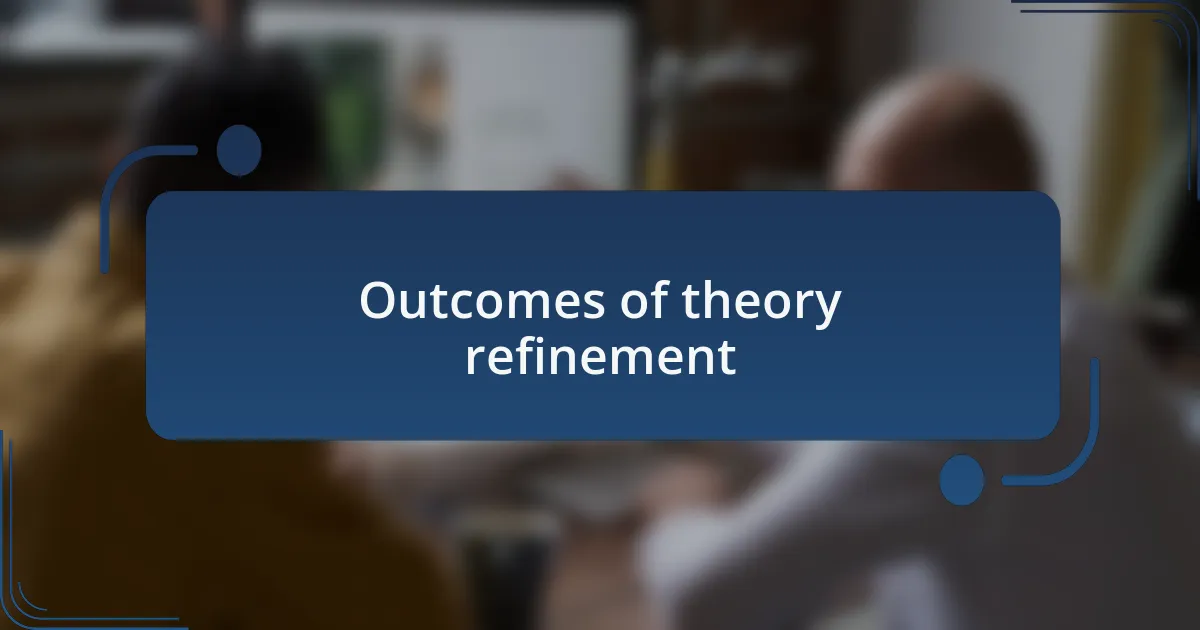
Outcomes of theory refinement
Outcomes of theory refinement can be profoundly transformative, not just for the theory itself, but for me as a practitioner. I remember the moment I realized that my refined communication framework now resonated with a broader audience. It was like a lightbulb flicking on—not only did I feel relieved, but I also felt empowered. Have you ever had that moment when your work suddenly connects with others in a way you hadn’t anticipated?
As the theory evolved, it also encouraged me to embrace a more iterative approach in my overall work. Each cycle of feedback and revision led me to uncover nuances I hadn’t considered before. I recall expressing my thoughts during a presentation, and the audience not only engaged but built upon my ideas. Isn’t it rewarding when your refinement process creates an open dialogue, enriching both your work and those who interact with it?
Moreover, the clarity achieved through theory refinement has deepened my confidence in communicating complex concepts. There was a time when I struggled to explain my ideas succinctly, but after rigorous refining, I found myself simplifying complex terminologies into relatable insights. This shift not only enhanced my presentations but also my relationships with colleagues. Have you ever found that simplifying your concepts can create stronger connections with your audience? It certainly did for me.

Lessons learned from my experience
I discovered that listening is as vital as articulating my ideas. During a feedback session, I was surprised when a quiet voice in the back shared a perspective that completely shifted my understanding of the framework. It made me realize that being open to others’ insights not only enriches theory refinement but also fosters deeper connections. Have you ever felt that sudden insight from someone you least expected?
Another lesson was the importance of patience in the refinement process. Initially, I wanted swift changes and quick adoption of my ideas. However, I learned that taking time to digest feedback led to more meaningful adjustments. I recall spending a few weeks considering the input of a trusted mentor before finalizing my approach. That patience paid off, resulting in positive reception when I finally shared it. How often do we rush things when taking a step back could yield better results?
Lastly, I’ve come to understand that self-reflection is crucial in this journey. Each round of refinement prompts me to ask critical questions about my intentions and audience needs. I remember sitting with my notebook, contemplating what truly mattered to my audience, and it made a world of difference in shaping the final delivery of my concepts. Have you ever found that reflection can lead to unexpectedly powerful insights?